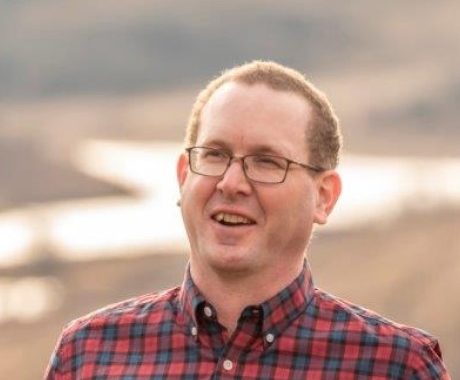In our September 2021 newsletter, we profiled Cherie Copithorne-Barnes and CL Ranches. In this edition, we expand on our brief introduction to Sean McGrath and Round Rock Ranching to discover a few more of the fascinating details about the Round Rock. Spoiler alert: it’s about as “Ponderosa” as it gets.
Round Rock Ranches traces its lineage back to 1906 when David Ganton filed the homestead application on the Battleford Trail. Here, 6 km north of the northern tip of the Battleford River between the Grizzly Bear and Benner Coulee junctions, young David planted the family flag. Since then, the branding iron has been passed to David’s son Charles, Charles’ daughter Mary, and then to her son Fred (Sean’s father). Today, Fred (who just turned 84) and his wife Anne, still help on the ranch with Sean and his wife Tanya handling the management as they improve the land and cattle to transfer responsibility to their three children who are growing up fast!
Today, the ranch consists of an Angus-based cowherd of 250+ head raised on 3,200 acres of land of which 85% is still native rangeland. The operation of the ranch is based on a few simple principles. The first is that “Mother Nature can do amazing things if you let her”. In practical terms, it means management working with nature and protecting the land so it can continue to operate for the upcoming 6th generation as it has done for the first five. This strategy allows native grasses to thrive while promoting healthy wildlife habitats, carbon sequestration and biodiversity.
The second principle is to maintain an outward focus. This has meant always trying to see Round Rock through the eyes of others, primarily their customers, be it a feedlot purchasing feeder cattle, a neighbour purchasing F1 replacement heifers or the consumer eating grass-fed beef.
The third is to create the “Best Beef in a Better World”, which flows out of working with, not against, the nature of the land, and starting with the end in mind. Logically, this leads to selecting cattle that best integrate with the land’s natural attributes and has resulted in the development of the ranch’s own Ranchmaker Herd. The Angus-based herd is bred to improve and optimize the balance between the maternal traits that drive fertility and profitability while delivering balanced growth and carcass characteristics that cattle buyers and consumers demand.
The ranch philosophy places a high degree of importance on hybrid vigour. In Sean’s words, “The research has repeatedly shown the advantages of heterosis (hybrid vigour) in terms of improved producer profitability,” continuing that, “Compared to a straightbred cow, the F1 cow averages the equivalent of weaning 1 extra calf (on average) in her lifetime through enhanced fertility, improved disease resistance, stronger maternal ability, and greater calver resilience and growth.” These are principles that John Basarab developed into EnVigour HX™ and Gentec continues to apply to developing value for commercial producers. See above links.
Typical of the practicality exhibited by ranchers (and the above focus on the customer), Sean does qualify that his own herd is largely straight-bred Angus, admitting that they do lose some of the associated benefits of hybrid vigour. In his view, however, this loss is more than offset by the greater flexibility provided by producing F1 replacements desired by their customers.
The evolution of Round Rock Ranch and the principles outlined above have led the ranch to become involved with and recognized by many industry and environmental initiatives. Among these, the ranch participates in many research initiatives relating to environmental health as well as beef production (including Gentec initiatives); Alternative Land Use Services (ALUS); has achieved Landscape Health Verification through the Cows and Fish REAL Beef Program; complies with Verified Beef Production Protocols; has an Environmental Farm Plan associated with the ALUS program; and was awarded the 2014 Canadian Cattlemen’s Association Environmental Stewardship Award (TESA).

